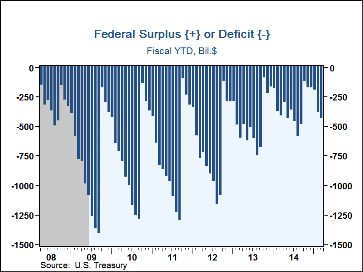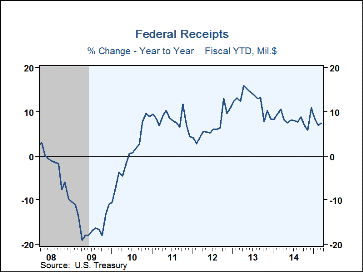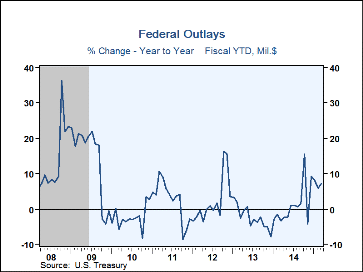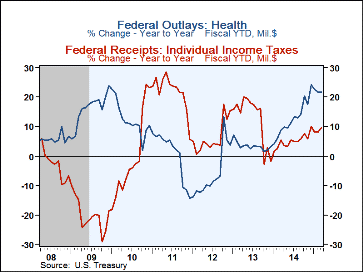 Global| Apr 13 2015
Global| Apr 13 2015U.S. Budget Deficit Continues to Deepen in FY 2015
by:Tom Moeller
|in:Economy in Brief
Summary
The Federal Government reported a $52.9 billion budget deficit during March compared to a $36.9 billion deficit during March of 2014. A deficit of $43.0 billion had been expected in the Action Economics Forecast Survey. For the first [...]
The Federal Government reported a $52.9 billion budget deficit during March compared to a $36.9 billion deficit during March of 2014. A deficit of $43.0 billion had been expected in the Action Economics Forecast Survey. For the first six months of Fiscal Year 2015 the deficit deepened to $439.5 billion compared to a $413.3 billion deficit in the first six months of FY 2014. Projections from the Congressional Budget Office call for a budget deficit of $486 billion in FY 2015 compared to $483.4 billion last year, then a $455 billion deficit in FY 2016.
The deeper deficit so far this fiscal year versus FY'14 occurred as outlays rose 7.1% y/y, driven by a 21.7% surge in spending on health programs. Medicare spending also rose a quickened 9.4% y/y and Social Security payments gained a stable 4.4%. National defense outlays declined 3.0% y/y and income security payments fell 2.4% y/y with lower unemployment. Spending on education, training & social services increased 23.7% y/y while veterans benefits rose 5.2% y/y. Social Security spending increased a stable 4.4% y/y while net interest spending fell 9.3% y/y due to the shrinking deficit.
Net revenues so far in FY 2015 improved 7.3% y/y as corporate income taxes gained 12.4% y/y. Individual income taxes rose 9.7`% y/y and social insurance taxes gained 3.7% y/y. Excise taxes increased a stable 2.7% y/y.
Haver's basic data on Federal Government outlays and receipts are contained in USECON. Considerable detail is given in the separate GOVFIN database. The Action Economics Forecast Survey numbers are in the AS1REPNA database.
| US Government Finance | Mar | FY'14 | FY'13 | FY'12 | FY'11 | |
|---|---|---|---|---|---|---|
| Budget Balance | -- | $-52.9 bil. | $-483.4 bil. | $-680.2 bil. | $-1,089.2 bil. | $-1,296.8 bil. |
| As a percent of GDP | -- | 2.8 | 4.1 | 6.8 | 8.4 | |
| % of Total | FY'15 YTD | |||||
| Net Revenues (Y/Y % Change) | 100 | 7.3% | 8.9% | 13.3% | 6.4% | 6.5% |
| Individual Income Taxes | 47 | 9.7 | 5.9 | 16.3 | 3.7 | 21.5 |
| Corporate Income Taxes | 10 | 12.4 | 17.3 | 12.9 | 33.8 | -5.4 |
| Social Insurance Taxes | 34 | 3.7 | 8.0 | 12.1 | 3.2 | -5.3 |
| Excise Taxes | 3 | 2.7 | 11.1 | 6.3 | 9.2 | 8.2 |
| Net Outlays (Y/Y % Change) | 100 | 7.1 | 1.4 | -2.4 | -1.7 | 4.1 |
| National Defense | 18 | -3.0 | -4.7 | -6.3 | -3.9 | 1.7 |
| Health | 10 | 21.7 | 14.2 | 3.1 | -7.0 | 1.0 |
| Medicare | 14 | 9.4 | 2.8 | 5.5 | -2.8 | 7.5 |
| Income Security | 16 | -2.4 | -4.3 | -1.1 | -9.1 | -4.1 |
| Social Security | 24 | 4.4 | 4.6 | 5.2 | 5.8 | 3.4 |
| Veterans Benefits & Services | 4 | 5.2 | 7.7 | 11.5 | -2.0 | 17.3 |
| Education, Training, Employment & Social Services | 3 | 23.7 | 25.9 | -21.9 | -10.3 | -20.6 |
| Interest | 6 | -9.3 | 3.0 | 0.4 | -3.0 | 15.8 |
Tom Moeller
AuthorMore in Author Profile »Prior to joining Haver Analytics in 2000, Mr. Moeller worked as the Economist at Chancellor Capital Management from 1985 to 1999. There, he developed comprehensive economic forecasts and interpreted economic data for equity and fixed income portfolio managers. Also at Chancellor, Mr. Moeller worked as an equity analyst and was responsible for researching and rating companies in the economically sensitive automobile and housing industries for investment in Chancellor’s equity portfolio. Prior to joining Chancellor, Mr. Moeller was an Economist at Citibank from 1979 to 1984. He also analyzed pricing behavior in the metals industry for the Council on Wage and Price Stability in Washington, D.C. In 1999, Mr. Moeller received the award for most accurate forecast from the Forecasters' Club of New York. From 1990 to 1992 he was President of the New York Association for Business Economists. Mr. Moeller earned an M.B.A. in Finance from Fordham University, where he graduated in 1987. He holds a Bachelor of Arts in Economics from George Washington University.
More Economy in Brief
 Global| Feb 05 2026
Global| Feb 05 2026Charts of the Week: Balanced Policy, Resilient Data and AI Narratives
by:Andrew Cates










